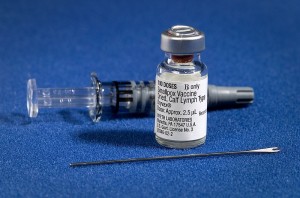MONDAY, 24 MAY 2010
A research study published in Biomed Central (BMC) Immunology by scientists from George Mason University, George Washington University and the University of California, highlights that vaccines given to prevent the spread of smallpox, also produce a five-fold reduction in HIV replication in the laboratory [1]. The results suggest that the end of smallpox vaccination in the mid-20th century may have contributed to the rapid spread of HIV.The research team compared HIV-1 susceptibility in the peripheral blood mononuclear cells taken from people recently immunised against the smallpox virus, to those who were not vaccinated. They found significantly lower viral replication in blood cells from vaccinated individuals. The study proposes that vaccination may protect against HIV by producing long-term alterations in the immune system, possibly including the expression of a certain receptor, CCR5, on the surface of a person's white blood cells. Since HIV-1 infections are almost exclusively caused by the CCR5-tropic HIV-1 strains, the prior immunisation may provide some degree of protection to subsequent HIV infection or/and progression.
Though the results are interesting and may lead a new weapon against the HIV pandemic, they are very preliminary and it is too soon to recommend the general use of smallpox vaccines for fighting HIV.
Written by Nitika Somani

